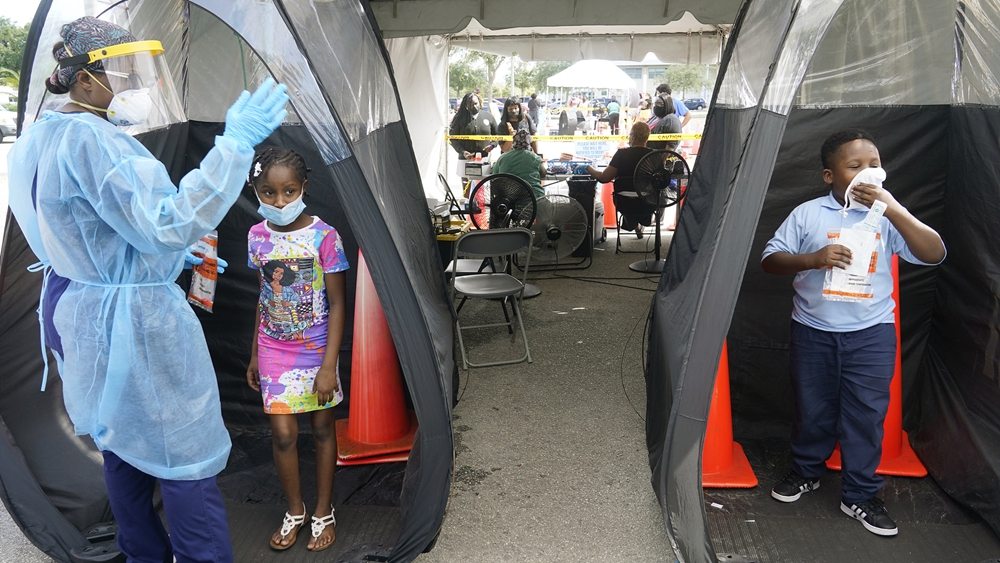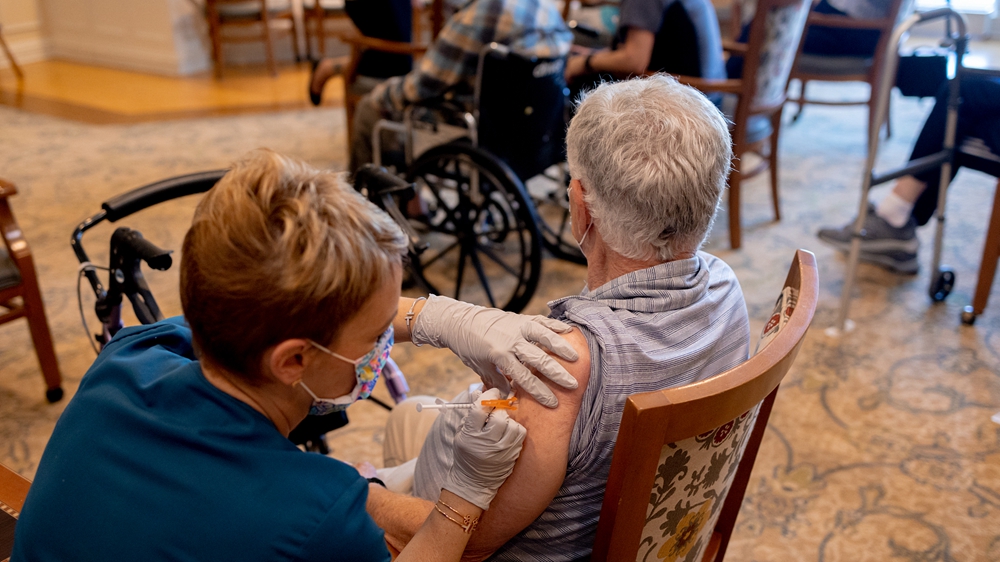
Two children wait to get tested for COVID-19 in North Miami, Florida, U.S., August 31, 2021. /CFP
Two children wait to get tested for COVID-19 in North Miami, Florida, U.S., August 31, 2021. /CFP
As the United States surpasses the mark of an average of 160,000 new COVID-19 cases a day, the spread of the more transmissible Delta variant of the coronavirus and the return of many students to the schools for a new academic year seriously concern officials and health experts.
The pandemic is not only stretching hospitals thin with the surge of patients, particularly unvaccinated people and children, but also wearing the country out in the fields of tourism and social welfare.
Differing mask policies in states
More U.S. kids were hospitalized with COVID-19 this month than any other time this past year. Between August 20 and 26, an average of 330 children were admitted to hospitals every day with COVID-19, according to the U.S. Centers for Disease Control and Prevention (CDC).
That's the highest rate of new COVID-19 hospitalizations among children in more than a year – a record that was broken several times in August, according to CDC data.
CNN on Tuesday quoted doctors as saying that it's crucial to protect children against the Delta variant, not just for the sake of their health and to keep in-person learning, but also to help prevent more aggressive variants from setting the entire country back.
Pennsylvania Governor Tom Wolf announced an order going into effect statewide on September 7, under which masks must be worn inside buildings of K-12 schools, child care providers, and early learning programs.
In contrast with Pennsylvania, Arizona ignored federal recommendations and banned school mask mandates weeks before classes resumed. Now, as the state's students are back in school, coronavirus infections are forcing thousands of children and teachers into quarantine. Education groups have sued to overturn the mask-mandate ban, and more than a dozen school districts across Arizona have passed mask mandates despite the ban.

Cars line up at Canadian side of the border between Canada and the United States, near Seattle, Washington and Vancouver, British Columbia, August 9, 2021. /CFP
Cars line up at Canadian side of the border between Canada and the United States, near Seattle, Washington and Vancouver, British Columbia, August 9, 2021. /CFP
Unvaccinated advised not to travel
Due to the surge of COVID-19 cases, CDC Director Rochelle Walensky asked on Tuesday that unvaccinated Americans not to travel during the upcoming holiday weekend as Labor Day falls next Monday.
"First and foremost, if you are unvaccinated, we would recommend not traveling," said the director, adding that while people who are fully vaccinated can travel with precautions, current transmission rates mean they, too, need to take COVID-19 risk into consideration when deciding whether to travel.
Health experts have said that vaccination is the best way to protect against the virus' spread, and of those eligible for vaccinations, which includes Americans 12 years old and older, 38.5 percent are not fully vaccinated yet, according to data from the CDC.
This week, data presented by a CDC vaccine adviser showed a hospitalization rate 16 times greater in the unvaccinated population than in those vaccinated.

A healthcare worker administers a third dose of the Pfizer-BioNTech COVID-19 vaccine at a senior living facility in Worcester, Pennsylvania, U.S., August 25, 2021. /CFP
A healthcare worker administers a third dose of the Pfizer-BioNTech COVID-19 vaccine at a senior living facility in Worcester, Pennsylvania, U.S., August 25, 2021. /CFP
Insufficient funds for the aged
Partly due to the coronavirus pandemic, the Social Security trust funds most Americans rely on for their retirement will run out of money in 12 years, one year sooner than expected, according to an annual government report.
Two Social Security funds are overseen by the Treasury Department: the Old-Age and Survivors Insurance Trust Fund and the Disability Insurance Trust Fund.
"The finances of both programs have been significantly affected by the pandemic and the recession of 2020," the Treasury Department said on Tuesday.
The combined effects of a dive in employment, interest rates, earnings and GDP, as well as higher mortality for the next few years "all significantly impact the outlook of the programs."
CNBC reported that "the circumstances, which were exacerbated by the COVID-19 pandemic, threaten to shrink retirement payments and increase healthcare costs for Americans in old age sooner than expected," and "the financial outlook for Social Security and Medicare, two of the nation's preeminent safety net programs, has deteriorated over the past year."
(With input from Xinhua News Agency)

